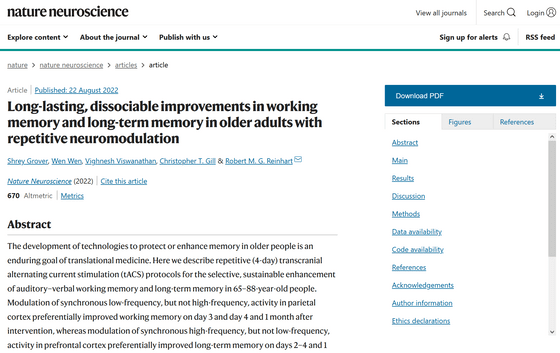Research results that passing an electric current to the brain improves the memory of the elderly

As people get older, their memory declines, and in some cases, they develop dementia or Alzheimer's disease, making it difficult even for daily life. A new experiment in which the brain of the elderly was stimulated with an electric current revealed that giving 20 minutes of electric current every day for 4 days improved the memory of the elderly for a month.
Long-lasting, dissociable improvements in working memory and long-term memory in older adults with repetitive neuromodulation | Nature Neuroscience

Electrical currents to the brain improve memory for older adults, study finds - The Verge
Shree Glover, an expert in psychology and brain science at Boston University, gave volunteers aged 65 to 88 20 minutes of current stimulation for 4 consecutive days and performed a test to measure memory.
Volunteers were required to memorize a randomly given list of words and were asked to recall them again during the stimulus period and after a one-month interval.
They found that the stimulus group had significantly higher memory performance than the non-stimulation group, and that the pattern of results did not change when considering age, gender, and years of education. rice field.

According to neuroscience professor Robert Reinhardt, who was involved in the study, those who improved their memory faster in the four days of stimulation tended to improve their memory more strongly one month later. And the biggest leaps were in those who had the lowest cognitive performance before the study began.
Reinhardt said, ``The device used in this study is just an experimental tool, but it is safe and has almost no side effects other than a little itching and tingling sensation.Therefore, research continues to show that it is useful for memory. If so, the day may come when patients can use it at general hospitals.'
The volunteers who participated in this study did not have a specific disease such as Alzheimer's disease, but the research team plans to continue the experiment with Alzheimer's patients in the future.
Related Posts:
in Science, Posted by log1p_kr







